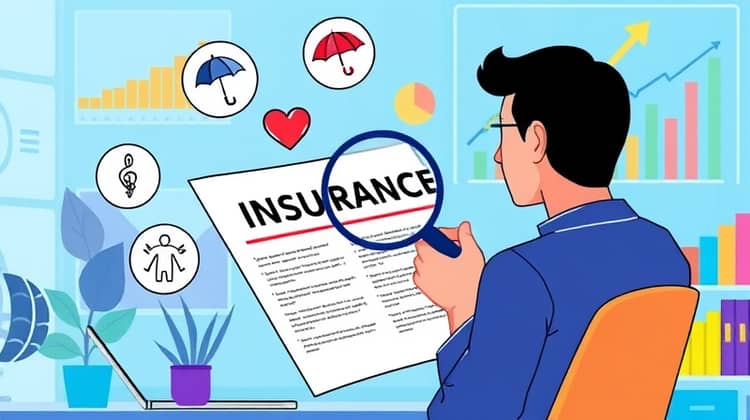Obtaining an insurance quote is more than just comparing prices; it's about ensuring you have the right coverage to fit your needs. Understanding the details of your policy can save you from costly mistakes later on. Before committing to an insurance company, there are essential questions you should ask to clarify your coverage options. Here are ten fundamental questions that will guide you in choosing the right insurance policy.
These questions are designed to help you navigate the complexities of insurance policies, ensuring that you are well-informed and adequately covered. Whether you're looking into auto, home, or health insurance, being proactive by gathering the necessary information can empower you to make a sound decision tailored to your unique circumstances.
1. What Type of Coverage Do I Need?

When considering an insurance policy, the first step is determining what type of coverage you need. Different insurance policies offer a variety of protections, and understanding the differences can direct you to the right policy. For instance, if you're insuring a car, you may need liability coverage, collision coverage, and comprehensive coverage, while a homeowner may be more concerned with property damage and liability.
Take the time to evaluate your individual situation. Assess the value of your assets and the risks associated with your lifestyle, which may affect the type of coverage you require. Additionally, it helps to educate yourself on common insurance terms and the various types of coverage available to get a clearer picture of your needs.
Once you have an understanding of your coverage needs, don't hesitate to ask your insurance agent for insights as they can provide you with tailored recommendations based on your unique circumstances.
- Consider what assets you need to protect, such as your home, car, or business.
- Evaluate any specific risks you may face in your personal or professional life.
- Ask about any additional coverage options that may be beneficial for your situation.
2. How Much Will My Deductible Be?

The deductible is a crucial aspect of your insurance policy, influencing your overall out-of-pocket expense in the event of a claim. Understanding how much your deductible will be is imperative as it affects not only your premium costs but also your financial responsibility in the event of a loss. Premiums generally decrease as deductibles increase, but you must weigh whether you can comfortably afford a higher deductible.
It's also essential to understand how the deductible applies. For instance, if you have a car accident, will your deductible be taken from the total damage amount, or are there other fees that will apply as well? Clarifying these points will help prevent surprises when you need to file a claim.
- Ask for options on deductible amounts and how they affect your premiums.
- Inquire whether different deductibles apply for different types of claims (like natural disasters or auto accidents).
- Consider your financial situation to decide on a deductible you can realistically pay if needed.
3. What Are the Coverage Limits?

Coverage limits define the maximum amount an insurer will pay for a loss covered by your policy. Knowing these limits is crucial, as they dictate how much financial protection you will have in case of a claim. You should always compare coverage limits to ensure that they align with the value of what you are insuring, especially for high-value items like homes or vehicles. Also, review the policy to see if the limits can be adjusted to better match your needs.
Additionally, understanding how limits apply in various situations can prevent potential gaps in coverage. For example, a health insurance policy may have limits on certain procedures, while a homeowner's policy may have a cap on personal property claims. Be sure to clarify these details with your insurer.
- Confirm the maximum payout for various types of claims within your policy.
- Ask if there are different limits for different coverage types (e.g., personal property vs. liability).
- Learn about any factors that might trigger a change in coverage limits, such as policy renewals or upgrades.
4. Are There Any Exclusions or Limitations?

Exclusions and limitations can significantly impact the effectiveness of your insurance policy. These refer to specific events, circumstances, or items that the insurance coverage will not protect. It's crucial to know what is excluded from your policy, as you don't want to find out too late that a significant risk is not covered.
Understanding exclusions can also help you address any gaps in your coverage by suggesting additional riders or separate policies to cover risks that the primary policy doesn't include.
- Ask for a complete list of exclusions to understand what is not covered.
- Inquire if there are any limitations regarding service providers, such as in health insurance plans.
- Explore options for optional coverages that can fill in potential gaps due to exclusions.
5. Is This a Replacement Cost or Actual Cash Value Policy?

Understanding whether your policy operates on a replacement cost (RC) or actual cash value (ACV) basis is crucial for evaluating its potential payout in the event of a claim. A replacement cost policy typically covers the full cost of replacing damaged property without deducting depreciation, which can be beneficial for policyholders.
In contrast, an actual cash value policy factors in depreciation, which could lead to lower payouts when you file a claim. This distinction can have significant implications on your financial recovery following a loss.
- Ask how the insurer determines replacement cost versus actual cash value.
- Inquire if policies can be upgraded from ACV to replacement cost.
- Clarify any additional costs that may be associated with opting for RC coverage.
6. Will My Rates Change Over Time?

Insurance rates are not static; they can fluctuate based on various factors. Knowing whether your rates are likely to change can help you budget accordingly. Some insurers offer a guaranteed rate for a specific period, while others may review your rates annually based on claims history, underwriting criteria, and market conditions.
It's wise to ask about what potential factors could cause your rates to rise or fall over time. This understanding can prepare you for possible adjustments to your budget that may occur after your initial policy term.
- Request information on the insurer’s policy for changing rates over time.
- Inquire about the specific factors that influence rate adjustments (like claims history).
- Ask about potential rewards for good behavior, such as safe driving or home maintenance, that might keep rates down.
7. Are There Any Discounts Available?

Many insurers offer various discounts that can help lower your overall insurance costs. Inquire about available discounts, as they can significantly reduce your premiums without compromising coverage. These discounts can be contingent upon different factors such as bundling multiple policies, possessing protective devices like alarms in your home, or maintaining a clean driving record.
Be proactive in asking for specific discounts you're aware of or curious about, as insurers may not always disclose every option unless prompted.
- Ask about multi-policy discounts if you bundle home and auto insurance.
- Inquire if discounts are available for being claims-free for a certain number of years.
- Ask about additional discounts for safety features in your home or car.
8. What Happens If I File a Claim?

Understanding the claims process is vital for any policyholder. Knowing how to file a claim, the expected timeframe for resolution, and how your insurer communicates through the process can help alleviate confusion. You should also factor in your deductible and any limitations that apply to ensure clarity about your financial obligations.
In addition to the claims process, it’s crucial to understand how a claim may impact your future premiums. Some claims can lead to higher rates or policy non-renewals, whereas others may not have a significant effect.
- Ask for a step-by-step guide on how to file a claim.
- Inquire about typical claim processing times and communication methods throughout the process.
- Ask how filing a claim might affect your future policy rates.
9. Can I Cancel My Policy at Any Time?

While some policies allow for easy cancellation, others may include terms that make it more complicated. It's essential to ask upfront about the cancellation policy since some companies impose fees or require notice before cancellation. Understanding these terms can prevent you from incurring unnecessary costs down the line.
- Inquire about the process for canceling your policy and any associated fees.
- Ask if there are specific conditions or durations that affect your ability to cancel.
- Clarify any potential refunds or credits for unused premiums.
10. Is the Insurer Financially Stable?

The financial stability of your insurer is paramount for ensuring their ability to pay claims when necessary. You can do this by researching ratings from financial rating agencies or checking industry reports. Asking your insurance agent or company about their financial stability or performance can give you an insight into their reliability as an insurer.
It’s not just about choosing a reputable company, but also about ensuring they have the resources to fulfill claims obligations. The last thing you want is to find yourself with an unresponsive insurer in times of need.
Conclusion

Taking the time to ask these ten essential questions can make a significant difference in your insurance purchase experience. By gaining clarity on the specifics of coverage, policy limitations, claims processes, and financial standings, you can make informed decisions that will provide peace of mind and protection. Remember, being proactive in understanding your insurance policy is an investment in safeguarding your future.














